Tent camping near St. Charles, Missouri provides access to the eastern edge of Missouri's wine country along the Missouri River valley. Most campgrounds in the region sit at elevations between 450-700 feet, with summer temperatures averaging 85-90°F during peak camping season. Spring and fall offer milder temperatures in the 60-75°F range, creating ideal conditions for hiking the numerous trails that connect to many campsites.
What to do
Fishing opportunities: Klondike Park features a stocked pond perfect for casual anglers. "Great fishing pond by the campground," notes Annie C., who recommends paying "the extra $3 for a basic site" to get access to "really nice covered picnic tables."
Wine country exploration: The Augusta region provides excellent access to Missouri's historic wine country. "This Campground places you in the heart of Missouri Wine Country and there's a perfect base for visiting the wineries and restaurants along highway 94," reports Marty C., who stayed at St. Charles County Klondike Park.
Trail access: Several parks provide direct connection to the Katy Trail, a 240-mile rail trail spanning much of Missouri. "I have bike-packed along the Katy and this is an excellent spot for an overnight(s) stay. It is a tough, but short, climb from the trail," says Mike L. about St. Charles County Klondike Park, noting that you "may have to walk up the hill" when accessing from the trail.
Wildlife viewing: Conservation areas offer chances to spot local wildlife. "We had a picnic and the kids got to play on the playground equipment," shares Leo S. about McCully Heritage Project, where the natural areas surrounding the campsites attract numerous bird species.
What campers like
Privacy variations: Different campgrounds offer varying levels of seclusion. "Some are more private and shaded than others. Our site, 35, like its neighbor sites was small and pretty close to others. Other sites like #19 and 20 were more secluded, offered more trees and privacy," explains Shawn M. about his stay at St. Charles County Klondike Park.
Free primitive options: For campers seeking budget options, free conservation area camping exists within driving distance. "There are single campsites on both the north and south ends of the conservation area... it is free," explains Annie C. about Little Lost Creek Conservation Area, noting there's "a great hike down into a valley with the actual Lost Creek at the bottom, completely worth the hard hike back up."
Clean facilities: Many campers appreciate the well-maintained facilities. "Best campsite ever! Even has a shared camp kitchen very clean showers house very spacious," writes Jonathan P. about St. Charles County Klondike Park, adding that while "some campsites are close together," the amenities make it worthwhile.
Multiple terrain types: The region offers diverse landscapes within single parks. "Trails are beautiful and perfect for families wanting to just come to a park for a day and hikers," notes Jake K. about St. Charles County Klondike Park, highlighting the "multiple terrains" available within one location.
What you should know
Limited availability: Tent sites at popular parks fill quickly, especially during peak seasons. "I am not a fan of how small and close together these sites are and during the season they fill up quickly," reports Teresa B. about Dr. Edmund A. Babler Memorial State Park Campground.
Seasonal facility closures: Winter camping requires self-sufficiency at many parks. "Not having water available except at the camp host, and no open restrooms and showers until after April 1, regardless of when the last freeze is was inconvenient for a spring break trip," shares Archie S. about Dr. Edmund A. Babler Memorial State Park Campground.
Wildlife encounters: Be prepared for local wildlife visiting campsites. "The racoons don't give a darn who you are. They will walk right up to, smile, and take your chips," warns April D. about Babler State Park, calling them "scandalous."
Site spacing concerns: Several campgrounds have closely positioned sites. "The campground is not very large. Most of the sites are small," explains Scott M. about Dr. Edmund A. Babler Memorial State Park Campground, adding that it "works well for me since I like to talk and meet other campers. However, if you prefer some space while camping, this one may not be for you."
Tips for camping with families
Kid-friendly trails: Look for parks with shorter, manageable trails. "The park has a lot to offer. The trails are not too long but can be challenging for small kids or folks that are not used to hiking," advises Scott M. about Dr. Edmund A. Babler Memorial State Park Campground.
Multi-activity options: Choose parks with diverse recreation. "A friend discovered this gem a while back and we now frequent it... We easily fit a dozen people over the 4th of July. Nice hiking trails near," shares Eric about McCully Heritage Project, mentioning they also enjoy fishing and "a place for us to launch our paddleboards and kayaks."
Site selection strategy: For families wanting privacy, consider specific sites. "We did a 2 night tent camp with my family and it was awesome," reports Greg E. about St. Charles County Klondike Park, where selecting the right site makes a difference.
Budget-friendly pricing: Look for affordable options with family-friendly pricing. "Ten dollars a night helps maintain land and natural area, all donation, very family oriented," shares Michele G. about McCully Heritage Project.
Tips from RVers
Site surface variations: RVers report mixed experiences with pad surfaces. "All campsites and patios are paved and level with a comfortable amount of space between sites," explains Nancy W. about Dr. Edmund A. Babler Memorial State Park Campground, adding that "Sites 13-33 are popular open and sunny campsites with nice grassy areas between them."
Electrical options: Some parks offer electrical hookups for small RVs. "There are 30 basic and 43 electric sites (which are either 50 amp or 30 amp). There is no sewer or water at individual sites but water spigots are scattered throughout the campground," notes Nancy W. about Babler State Park.
Turnaround constraints: Large rigs face navigation challenges. "Not all sites are long enough for large RVs and the roads in some loops prevent you from turning around," warns Nancy W., who recommends consulting "the camp hosts" who "are very helpful and have a list of site lengths."



